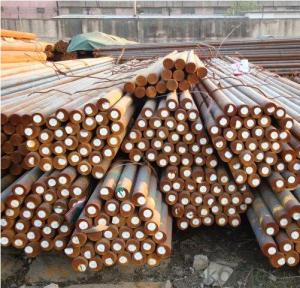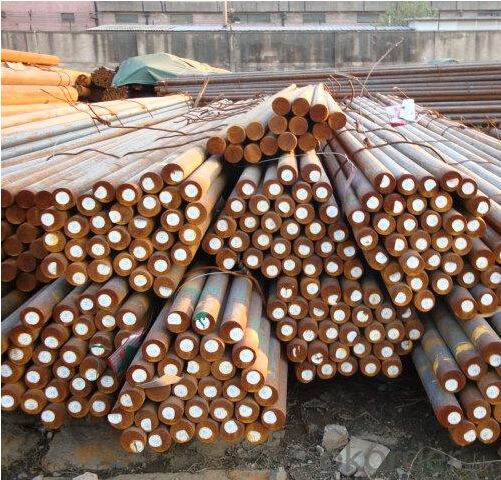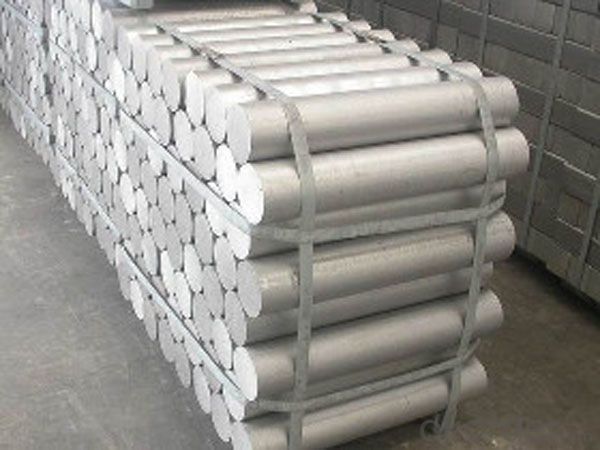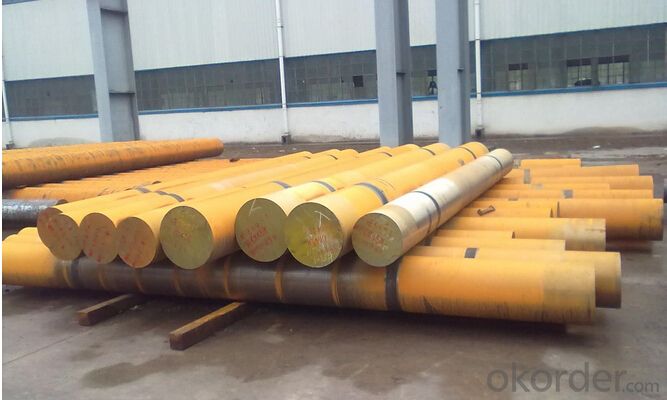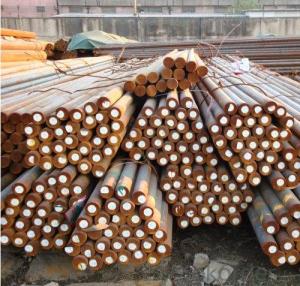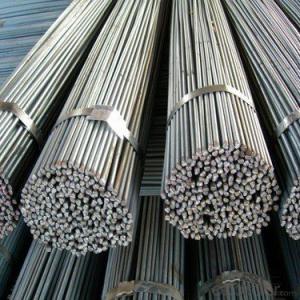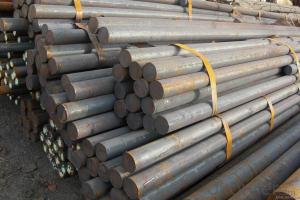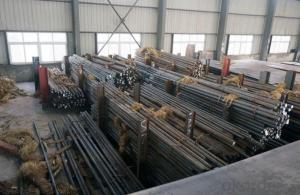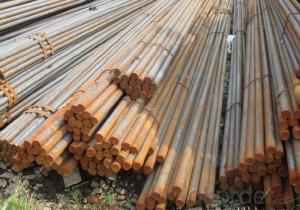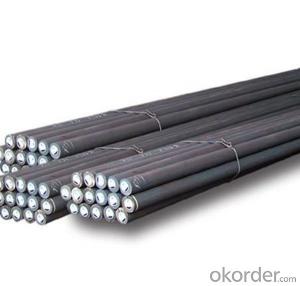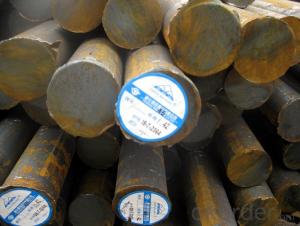Special Steel DIN 1.2601 Mould Steel Alloy Steel
- Loading Port:
- China main port
- Payment Terms:
- TT OR LC
- Min Order Qty:
- 25 m.t.
- Supply Capability:
- 10000 m.t./month
OKorder Service Pledge
OKorder Financial Service
You Might Also Like
Specification
Chemical Composition(%)
| Country | Standard | C | Si | Mn | Cr | Mo | V | S | P | W |
| GB | C12MoV | 1.45-1.70 | ≤0.40 | ≤0.40 | 11.00-12.5 | 0.40-0.60 | 0.15-0.30 | ≤0.030 | ≤0.030 | |
| DIN | 1.2601 | 1.55-1.75 | 0.25-0.40 | 0.20-0.40 | 11.00-12.0 | 0.50-0.70 | 0.10-0.50 | ≤0.030 | ≤0.030 | 0.40-0.60 |
Available Size
| Rolled flat steel | 12-90mm×205-610mm×L |
| Forged flat steel | 100-300mm×400-600mm×L |
Heat Treatment
| Item | Temperature℃ | Hardness |
| Anneal | 850-880 | ≤255HB |
| Quenching | No.1:980-1040 | 60-63HRC |
| No.2:1050-1130 | 42-50HRC | |
| Tempering | No.1:200-300(1) | 57-60HRC |
| No.2:200-300(2-3) | 58-62HRC |
Characterstics
| 1.High hardening ability and abrasion resistance | ||||||||
| 2.Less quenching deformation | ||||||||
| 3.Higher toughness and more homogeneous carbide distribution than Cr12 steel |
Applications: Suitable for various complicated cold working dies with high precision and long lifetime,such as punching dies,cold extrusion dies,thread rolling dies,screw plates,cold extrusion dies,and precise measuring devices
Product Show:

Workshop Show:

1, Your advantages?
professional products inquiry, products knowledge train (for agents), smooth goods delivery, excellent customer solution proposale
2, Test & Certificate?
SGS test is available, customer inspection before shipping is welcome, third party inspection is no problem
3, Payment Terms?
30% TT as deposit and 70% before delivery.
Irrevocable L/C at sight.
4, Trading Terms?
EXW, FOB, CIF, FFR, CNF
6, After-sale Service?
WE provides the services and support you need for every step of our cooperation. We're the business partner you can trust.
For any problem, please kindly contact us at any your convenient time.
We'll reply you in our first priority within 24 hours.
- Q: Can special steel be used in the energy sector?
- Yes, special steel can be used in the energy sector. Special steel refers to various types of high-performance alloys that are specifically designed for applications that require exceptional strength, durability, and resistance to corrosion and extreme temperatures. These properties make special steel an ideal choice for numerous components used in the energy sector. In the oil and gas industry, special steel is commonly used for the construction of pipelines, drilling equipment, and offshore platforms. Its high strength and corrosion resistance help in ensuring the integrity and reliability of these critical structures, even in harsh environments. Special steel is also widely utilized in power generation plants. For example, in thermal power plants, where steam is generated to produce electricity, special steel is used to manufacture boiler tubes and pressure vessels. The exceptional heat resistance and structural integrity of special steel ensure the safe and efficient operation of these components under high temperatures and pressure. Furthermore, special steel finds applications in renewable energy sectors such as wind and solar power. In wind turbines, for instance, special steel is used to manufacture rotor shafts, gears, and bearings, which are subjected to high mechanical loads. Similarly, in concentrated solar power plants, special steel is employed in the construction of the heat exchangers, receivers, and storage systems. Overall, the use of special steel in the energy sector is crucial for enhancing the overall performance, safety, and longevity of various components and structures. Its unique properties make it an indispensable material in supporting the energy industry's infrastructure and operations.
- Q: How is stainless tool steel used in the manufacturing of surgical instruments?
- Stainless tool steel is commonly used in the manufacturing of surgical instruments due to its exceptional properties such as corrosion resistance, high strength, and durability. This type of steel ensures that surgical instruments can withstand frequent sterilization processes without corroding or deteriorating. Additionally, stainless tool steel allows for precise shaping and sharpening of surgical instruments, ensuring their effectiveness and longevity in medical procedures.
- Q: What are the different types of free-cutting steel?
- There are several different types of free-cutting steel, including leaded free-cutting steel, sulfurized free-cutting steel, and phosphorus free-cutting steel. These types of steel contain certain elements that improve machinability and make them easier to cut or shape.
- Q: What are the main characteristics of alloy steel?
- Alloy steel, which is produced by incorporating specific elements like chromium, nickel, or molybdenum into iron, possesses distinct properties and qualities. Some key features of alloy steel are as follows: 1. Remarkable strength: Alloy steel is renowned for its exceptional strength. The introduction of alloying elements enhances its capacity to endure high pressures and heavy loads, making it an ideal choice for applications necessitating a robust and long-lasting material. 2. Enhanced hardness: Alloy steel is also recognized for its hardness, surpassing that of regular carbon steel. This attribute renders it resistant to wear, abrasion, and deformation, making it suitable for applications that require resistance to impact or wear, such as the production of cutting tools or machinery components. 3. Resistance to corrosion: Depending on the specific alloying elements employed, alloy steel can display excellent resistance to corrosion. For instance, the addition of chromium is a common practice to create stainless steel, which exhibits high resistance to rust and corrosion. This attribute positions alloy steel as a preferred material in industries where exposure to moisture or corrosive environments is prevalent. 4. Heat endurance: Alloy steel possesses the ability to withstand high temperatures without compromising its strength or structural integrity. The inclusion of elements like nickel, molybdenum, or vanadium augments its resistance to thermal expansion, oxidation, and softening at elevated temperatures. This quality renders alloy steel suitable for applications in the aerospace, automotive, and power generation sectors. 5. Versatility: Alloy steel is a versatile material that can be readily tailored to meet specific requirements. Manufacturers can create alloy steel with a broad range of properties, such as improved ductility, toughness, or electrical conductivity, by modifying the composition and proportions of alloying elements. This adaptability permits the utilization of alloy steel in diverse industries, encompassing construction, manufacturing, and engineering. In conclusion, alloy steel exhibits high strength, hardness, corrosion resistance, heat endurance, and versatility. These characteristics establish alloy steel as the preferred choice for a wide array of applications that demand a sturdy, durable, and dependable material.
- Q: How does special steel perform in automotive applications?
- Due to its outstanding performance characteristics, special steel is frequently utilized in automotive applications. It boasts superior strength, durability, and resistance to wear and corrosion, making it an ideal option for a wide range of automotive components. In terms of strength, special steel surpasses regular steel with its higher tensile strength, enabling it to withstand heavy loads and impacts. This strength is crucial in automotive applications where components must endure extreme forces while maintaining their structural integrity. Additionally, special steel displays excellent fatigue resistance, ensuring longevity and reliability even in demanding conditions. Furthermore, special steel's exceptional durability allows it to withstand harsh environments, including extreme temperatures, chemicals, and moisture. This durability assists automotive components in maintaining their functionality and performance over an extended period. Another significant advantage of special steel in automotive applications lies in its resistance to wear and corrosion. Automotive components are constantly exposed to friction, abrasion, and corrosive substances. Special steel's high wear resistance allows these components to endure prolonged use without experiencing significant degradation. Moreover, its corrosion resistance protects against rust and other forms of deterioration, preventing premature component failure. Additionally, special steel can be easily shaped and formed into intricate designs, empowering automotive manufacturers to create complex components with precise specifications. The versatility and formability of special steel make it an excellent choice for various automotive applications, including engine parts, suspension systems, chassis components, and exhaust systems. Overall, special steel's exceptional strength, durability, resistance to wear and corrosion, and versatility contribute to its status as a highly sought-after material for automotive applications. Its performance characteristics enhance safety, reliability, and efficiency in vehicles, establishing special steel as an integral part of the automotive industry.
- Q: What are the different heat treatment defects in special steel?
- There are several heat treatment defects that can occur in special steel during the heat treatment process. Some of the most common defects include: 1. Decarburization: This occurs when the surface layers of the steel lose carbon due to exposure to high temperatures in an oxygen-rich environment. Decarburization can lead to reduced hardness and strength in the treated steel. 2. Quench cracking: Also known as cracking during quenching, this defect occurs when the steel undergoes rapid cooling after being heated. The differential cooling rates can cause internal stresses, leading to cracks in the material. 3. Distortion: Distortion refers to the change in shape or dimension of the steel during the heat treatment process. It can occur due to non-uniform heating or cooling, inadequate fixturing, or improper quenching techniques. 4. Soft spots: Soft spots are localized areas of reduced hardness in the treated steel. These spots can occur due to insufficient heating or improper quenching, leading to reduced mechanical strength in those areas. 5. Overheating: Overheating is a defect that occurs when the steel is exposed to excessively high temperatures during the heat treatment process. This can result in grain growth, reduced toughness, and decreased overall material properties. 6. Case hardening problems: Special steels often undergo case hardening processes, such as carburizing or nitriding, to create a hard outer layer. However, several defects can occur during these processes, including insufficient or excessive hardening, poor case depth, or uneven hardness distribution. 7. Residual stresses: Residual stresses are internal stresses that remain in the steel after the heat treatment process. These stresses can lead to dimensional instability, warping, or even cracking if not properly controlled. To avoid or minimize these heat treatment defects, it is crucial to follow proper heat treatment procedures, including precise temperature control, adequate cooling rates, and appropriate fixturing techniques. Additionally, using high-quality heat treatment equipment, monitoring the process closely, and conducting thorough inspections can help detect and address any potential defects in special steel.
- Q: What are the safety considerations when handling special steel products?
- Special steel products require careful attention to safety. Firstly, wearing appropriate personal protective equipment (PPE) is crucial. Gloves, safety glasses, and steel-toed boots should be worn to safeguard against potential injuries from sharp edges, heavy weight, or flying debris. Secondly, it is important to take note of the weight and size of the special steel products. Mechanical lifting equipment or assistance from others may be necessary to prevent strain or injury when dealing with large or heavy items. Furthermore, a thorough inspection of the special steel products should be conducted prior to handling. This involves checking for cracks, fractures, or any other structural issues that could compromise their integrity. If any defects are discovered, they must be reported to the appropriate personnel and the products should not be used until they are deemed safe. In addition, specific handling techniques or tools may be required for special steel products. Strict adherence to the manufacturer's guidelines and instructions is crucial to ensure safe handling. This may involve utilizing specialized lifting equipment, clamps, or supports to prevent accidents or damage. Lastly, proper training and knowledge are essential for safe handling of special steel products. This includes understanding the weight limits of lifting equipment, knowing how to properly secure and stabilize the products, and being aware of any potential hazards or risks associated with the specific type of steel being handled. By adhering to these safety considerations, the risk of accidents, injuries, or damage can be minimized when dealing with special steel products.
- Q: How is special steel used in toolmaking?
- Special steel is used in toolmaking because of its exceptional properties such as high hardness, toughness, and wear resistance. It is utilized to manufacture various types of tools including drills, cutting tools, dies, and molds. The superior properties of special steel enable these tools to withstand high temperatures, resist deformation, and maintain sharpness for extended periods. Additionally, special steel can be heat treated to achieve specific characteristics, making it an ideal choice for toolmaking applications.
- Q: What are the different surface coatings available for special steel?
- There are several different surface coatings available for special steel, including galvanizing, electroplating, powder coating, and thermal spraying. These coatings help to enhance the steel's corrosion resistance, durability, and aesthetic appearance.
- Q: What are the different methods of preventing stress corrosion cracking in special steel?
- To prevent stress corrosion cracking in special steel, various approaches can be implemented: 1. Optimal steel alloy selection is pivotal, as it enhances resistance to stress corrosion cracking. Alloys like stainless steel, duplex stainless steel, and nickel-based alloys are renowned for their effectiveness against this type of corrosion. 2. Implementing surface treatments such as passivation or electroplating forms a protective layer on the steel surface. This serves to prevent the penetration of corrosive substances and diminishes the likelihood of stress corrosion cracking. 3. Employing stress relieving through heat treatment methods aids in reducing residual stresses within the steel, which can contribute to stress corrosion cracking. This procedure involves heating the steel to a specific temperature and gradually cooling it, effectively minimizing residual stresses. 4. The use of corrosion inhibitors aids in safeguarding the steel from corrosive environments. These inhibitors can be introduced into the system or applied as a coating on the steel surface, creating a barrier that prevents corrosive substances from reaching the steel. 5. Environmental control plays a crucial role in stress corrosion cracking prevention. Monitoring and regulating factors such as temperature, humidity, and the presence of corrosive substances are essential in minimizing the risk. 6. Incorporating cathodic protection techniques can effectively prevent stress corrosion cracking. This involves applying sacrificial or impressed current to the steel, acting as a cathode and shielding the steel from corrosion. 7. Proper design considerations are paramount in preventing stress corrosion cracking. Factors such as avoiding sharp edges, minimizing stress concentrations, and ensuring adequate drainage to prevent the accumulation of corrosive substances significantly reduce the risk. By employing a combination of these methods, stress corrosion cracking in special steel can be effectively prevented, ensuring the longevity and integrity of the structure.
Send your message to us
Special Steel DIN 1.2601 Mould Steel Alloy Steel
- Loading Port:
- China main port
- Payment Terms:
- TT OR LC
- Min Order Qty:
- 25 m.t.
- Supply Capability:
- 10000 m.t./month
OKorder Service Pledge
OKorder Financial Service
Similar products
Hot products
Hot Searches
Related keywords
